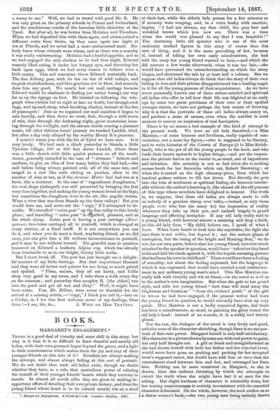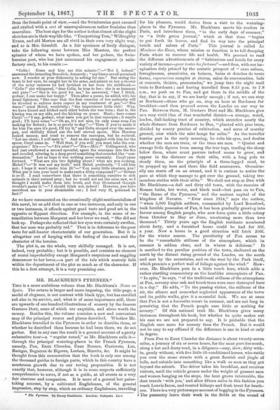li OOKS.
MARGARET'S ENGAGEMENT.*
THERE is a good deal of vivacity and some skill in this story, but why is it that it is so difficult to draw cheerful and saintly old ladies, with their own personal hopes beyond the grave, and a light in their countenances which makes them the joy and stay of their younger friends on this side of it? Novelists are always making the attempt, and almost always failing at this sort of portrait. We do not doubt that such old ladies exist, though we doubt whether they have, as a rule, that marvellous power of calming the tumult of their younger friends' hearts which they exercise in novels. In almost all novels alike they are given to making in- opportune offers of detailing their own private history, and then the young friend whose heart is to be calmed usually sits on a stool Maniere! ZWfapcmrnl. A Novel in ,3 Toll. London: Bentley. 1887. at their feet, while the elderly lady pauses for a few minutes as if memory were weeping, and, in a voice husky with emotion, begins, " I had not always, my dear child, the grey hair and wrinkled brows which you now see. There was a time when the world was pleased to say that I was beautiful !" The charming little old spinster who is one of the most anxiously studied figures in this story of course does this sort of thing, and it is the more provoking of her, because if, instead of telling her own early misadventure, she had told the story her young friend wanted to hear,—and which she did narrate a few weeks afterwards, when it was too late,—she would have prevented the misunderstanding on which the story hinges, and shortened the tale by at least half a volume. But we suppose that old ladies always do think that the story of their own falling in love and their private disappointment has a healing magic in it for all the young persons of their acquaintance. As we have never personally known one of these serene-minded and spiritual old ladies who offer to tell how their life was blighted at an early age by some too great petulance of their own or their spoiled younger sisters, we have not perhaps the best means of knowing why it is that the portraits of these old ladies always annoy us, and produce a sense of nausea, even when the novelist is most anxious to convey an impression of real fascination.
There is by no means a bad example of this kind of attempt in the present work. We have an old lady described,—a Miss Marston,—of some humour and liveliness, really capable of con- versation, not a mere lay figure,—who is supposed to be literary, and to write histories of the Courts of Europe (a is Miss Strick- land), who is the pet of all the young people in the book, and who leads their hearts upwards to higher things,—and yet the impres- sion the picture leaves on the reader is, as usual, one of impatience and irritation. She certainly is not so bad when she is making mouse-broth for her favourite white cat, Robert Browning ; or when she is seated on the high chimney-piece, from which her insolent godson refuses to lift her down. But directly she gets into the vein of sentiment or spiritual feeling she becomes intoler- able without the author's knowing it, like almost all the old persons of this type whom novelists have delighted to honour. The truth is, we suppose, that these old ladies are always made to talk as nobody of a genuine stamp ever talks,—indeed, as only those people write who lose (as many do) the impression of reality whenever they take up their pen, and embark largely in grand language and affecting metaphor. If any old lady really said to a young friend, with however sincere a meaning and deep a faith, as this old lady does, " My child, believe me, I speak- of what I know. When Love bends to look into the sepulchre, the light she sees there is not within, but beyond it ; not the meteor gleam of corruption, but the rising of the bright and Morning Star," we do not, for our own parts, believe that her young friend, however much attached to the speaker in question, would have " taken her tiny hand in his and laid his cheek against it, with the boyish caressing gesture thathad been his own in childhood." There woiild havebeen a feeling of unreality, not about the feeling expressed, but the language in which it was expressed, that would have created a real embarrass- ment in any ordinary young man's mind. This Miss Marston can really talk with vivacity and wit at times,—in the novel as well as in the author's own imagination. But when she gets to her grand style, and tells her young friend " how time will steal away the brightness and freshness" " from the etiolated youth" of the girl to whom he had been engaged, if the present writer had been the young friend in question he would certainly have shut, up very quick. Miss Marston is not a badly conceived figure, but there has been a misadventure, as usual, in painting the glory round the old lady's head : instead of an aureole, it is a sickly and watery gleam.
For the rest, the dialogue of the novel is very lively and good, and also some of the character-sketching, though there is no one por- trait of first-rate power. Margaret herself is only half-satisfactory. Her character is a pieturedrawn by some one withreal power to paint, but only half thought out. A girl so frank and straightforward as she had shown herself with both her father and her rejected lover, would never have gone on probing and probing for her accepted lover's supposed secret, but would have told him at once that the concealment stood between him and her, and estranged her from him. Nothing can be more unnatural in Margaret, as she is drawn, than this indirect thrusting by which she attempts to extort the truth when she might have had it at once for the asking. Her slight hardness of character is admirably done, but her teasing suspiciousness is entirely inconsistent with the essential character delineated. On the whole, however, the book strikes us as a clever woman's book,—the two young men being entirely drawn from the female point of view,—and the Swinburnian poet excused and exalted with a sort of unscrupulousness rather feminine than masculine. The best sign for the author is that almost all the slight sketches are in their waylife-like. "Temporizing Tom," Willoughby Evans, and old Morton are all vivid in their own very slight way, and so is Mrs. Grenfell. As a fair specimen of lively dialogue, take the following scene between Miss Marston, the perfect spinster of whom we have spoken, and her godson, the Swin- burnian poet, who has just announced his engagement (a satis- factory one), to his cousin :— "Colin! Come and kiss me this minute !"—" Not I, indeed," answered the intending Benedick, demurely ; " my kisses are all promised now. I wonder at your dishonesty in asking for one." But seeing the tears in her eyes, he caught her in his arms, and rained on her a shower of the noisy caresses he had lavished on her from his childhood.— " Colin !" she whispered, "dear Colin, be true to her ; she is so innocent and pure !"—" She is too good for me," he answered, "but I think, godma', I can make her happy." Then after a pause, he added, with his usual lightness, "She says that the first exercise of her authority will be directed to enforce more respect in my treatment of you."—" She dares !" cried Mabel, wrathfully ; "the impertinent little chit! Why, we have kissed and kicked each other before she was born ; that is, the kissing was on my side, and the kicking on yours. Hush; here comes Caryl."—"I say, godma', what have you got in that saucepan ; it smells good ; I'll have some."—" Oh no, it's not nice, its only some soup I'm making for Robert ; he is so poorly to-day."—" Then if you've made it for him I'm sure it's good, I'll try it," and Colin stooped over the sauce- pan, and skilfully fished out the half stewed spoon. Miss Marston looked uneasy, and tried to remove the saucepan, but he resisted. "Let me alone ; I will taste it." And as she struggled with him for the spoon, Caryl came in. "Well then, if you wild you must take the con- sequence ! It's—"—"It's what?"—"It's—Mice!" Collingwood, who had just swallowed a second spoonful, upset the saucepan into the fire and recoiled, uttering in a deep growl something that sounded like "con- demnation." Let us hope it was nothing more unseemly. Caryl came forward. " What are you two fighting about? what are you cooking,
Mabel ?"—"It was not my fault," said Mabel, penitently, told him not; I hope it won't make him ill."—" You nasty little creature, you! What put it into your head to make such a filthy compound ?"—"Robert is so ill. I read somewhere that there is something curative to sick animals in their natural prey ; but he would not eat the mice raw, so I thought I would make them into broth, and that ill-natured Georgie wouldn't make it."—" I should think not, indeed ! However, you have sacrificed me to your abominable cat ; I feel very ill, poisoned in fact !"
As we have commented on the occasionally slight sentimentalism of this novel, let us add that in one or two instances, and only in one or two instances, it offends against good taste and good art in the opposite or flippant direction. For example, in the scene of re- conciliation between Margaret and her lover we read, " She did not look up. Perhaps she reflected that her eyes were certainly swollen, that her nose was probably red." That is in deference to the poor taste for self-banter characteristic of our generation. But it is altogether out of keeping with the feeling of the scene and the character of the heroine.
The plot is, on the whole, very skilfully managed. It is not, indeed, very probable ; but it is possible, and contains no element of moral improbability except Margaret's suspicious and naggling demeanour to her lover,—a part of the tale which scarcely falls within the department of the plot so much as of the character. If this be a first attempt, it is a very promising one.































 Previous page
Previous page